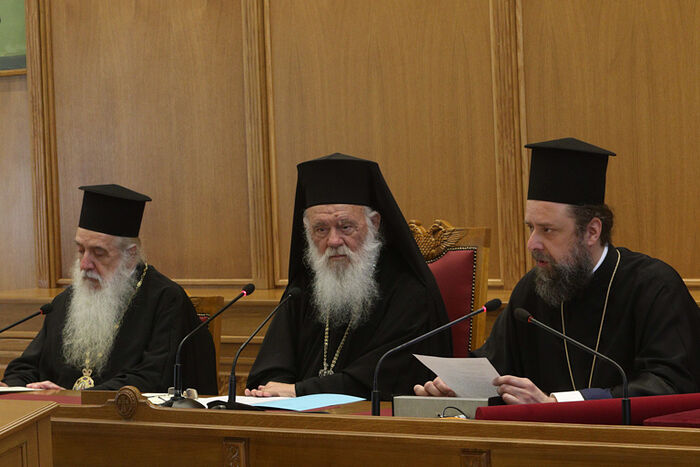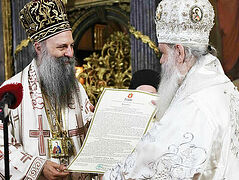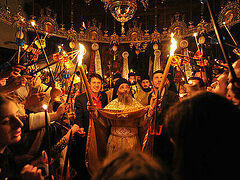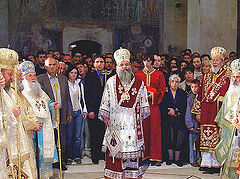Athens, June 8, 2022
The Permanent Holy Synod of the Church of Greece welcomes the Patriarchate of Constantinople’s decision to recognize the Macedonian Orthodox Church-Ohrid Archbishopric as canonical, but has “serious objections and reservations” about the Serbian Church’s decision to grant it autocephaly.
As Romfea reports, the Greek Synod takes issue with the Serbian Church on three points:
- The name given to the newly-autocephalous Church: “Macedonian Orthodox Church-Ohrid Archbishopric”
This issue has long been a sore spot in the Greek world, and Greece long disputed the name of the neighboring Republic of Macedonia, arguing that Macedonia is historically Greek and the Republic of Macedonia therefore doesn’t have the right to choose its own name. On June 12, 2018, the Treaty of Prespa was signed between Greece and Macedonia, with the latter officially changing its name to the Republic of North Macedonia.
However, it remains an issue within the ecclesiastical world as well. For example, in the fall of 2020, Metropolitan Theoklitos of Florina, Prespa, and Eordaia expressed the view that the MOC shouldn’t be given autocephaly because of its name, saying: “Since we don’t recognize the neighboring country as North Macedonia, how do you expect us to recognize ‘Macedonian’ autocephaly?... In my personal opinion, Patriarch Bartholomew shouldn’t grant them autocephaly.”
In September 2018, Patriarch Bartholomew himself announced that he would never recognize the MOC as long as they used the term “Macedonian” in their title. After it became publicly known in early May of this year that the Serbian and Macedonian Churches were engaged in fruitful negotiations to heal the 55-year schism, Constantinople quickly decided to recognize the MOC’s canonicity just a few days later.
In its decision to enter into communion with the Macedonian Church on May 9, the Synod of Constantinople dictated that it be named simply the “Ohrid Archbishopric.”
Conversely, in its own decision to receive the MOC back into communion as an autonomous Church, the Serbian Bishops’ Council didn’t place any restrictions on the Church’s name, but only recommended that it work the issue out in consultation with the Greek-speaking Churches. The same is written in the tomos of autocephaly given to the MOC on June 5.
Meanwhile, there are figures within the Bulgarian Orthodox Church who, on the other hand, reject not the term “Macedonian,” but “Ohrid Archbishopric,” as the Bulgarian Church understands itself as the successor to the ancient Ohrid Archbishopric.
- That it allows the MOC to keep its diaspora dioceses
In its decision, the Synod of Constantinople dictated that the MOC have canonical jurisdiction only within the Republic of Macedonia, which would deprive it of its four diaspora dioceses in Europe, North America, and Australia and New Zealand.
The decision doesn’t explicitly state what would happen to those dioceses. Most recently, when Constantinople gave a tomos of autocephaly to the schismatic “Orthodox Church of Ukraine,” it dictated that the diaspora parishes of the jurisdictions that united to form the OCU be given to Constantinople.
Again, the Serbian Church placed no such restrictions on the MOC.
The different attitudes of the Serbian and Constantinople Churches were emphasized by the Australian-New Zealand Diocese of the MOC when it published the full text of the tomos of autocephaly granted by the Serbian Church in an article entitled: “The SOC officially recognized the full autocephaly of the MOC-OA with a tomos, and in contrast to the Patriarchate of Constantinople, with no conditional clauses limits its autocephaly and structure in terms of its name, the scope of its jurisdiction in the home country, and the pastoral care for the Macedonian people in the diaspora.”
Conversely, the Greek Synod states that Constantinople’s decision to limit the name and territory of the MOC brings comfort to the clergy and people of Greece.
The Greek Church itself had diaspora parishes until 1922, when Patriarch Meletios Metaxakis of Constantinople declared Constantinople’s right to all Orthodox parishes outside the borders of the Local Orthodox Churches. The Greek Church initially resisted this move, but the government that came to power following a military coup compelled the Church of Greece to recognize Metaxakis as Patriarch in September 1922, including his transfer of the Greek diaspora parishes to his own omophorion.
- That the Serbian Church shouldn’t be granting autocephaly because that’s solely the prerogative of the Patriarchate of Constantinople
In this, the Greek Synod echoes the ecclesiology put forth by the Patriarchate of Constantinople, which is a matter of serious debate in the Orthodox world. Other Local Churches argue that a Mother Church has the right to grant autocephaly to Church bodies within itself—in this instance the Serbian Church granting autocephaly to the Macedonian Church, which was an autonomous Church of the Serbian Patriarchate.
In the 20th century, the Patriarchates of Moscow and Constantinople issued competing tomoses to the Churches of Poland, Georgia, and the Czech Lands and Slovakia, and Moscow also granted a tomos of autocephaly to the Orthodox Church in America in 1970, which Constantinople and several other Churches have refused to recognize, though it has been formerly recognized by the Churches of Poland, Bulgaria, and the Czech Lands and Slovakia, in addition to Russia.
Much of the controversy surrounding the schismatic “Orthodox Church of Ukraine” centers on the fact that Constantinople granted a tomos to people over which it had no canonical jurisdiction (it did the same with the Church of Poland in 1924, which was part of the Moscow Patriarchate at the time).
It seems that the leadership of the Macedonian Church is also following Constantinople on this issue. His Eminence Archbishop Stefan has said that he awaits a universally recognized tomos of autocephaly from Constantinople, though it isn’t clear if the MOC will consent to being deprived of its name and diaspora dioceses.
In the meantime, the Greek Synod has referred the matter to its Synodal Committees on Doctrinal and Canonical Issues and on Inter-Orthodox and Inter-Christian Relations to examine the issue and make further recommendations for the Synod.
Follow OrthoChristian on Twitter, Vkontakte, Telegram, WhatsApp, MeWe, and Gab!





